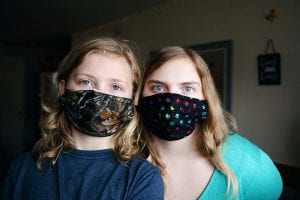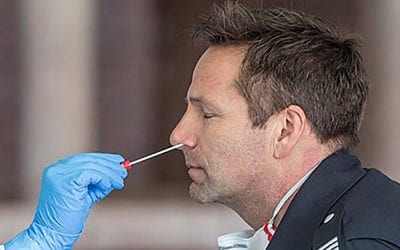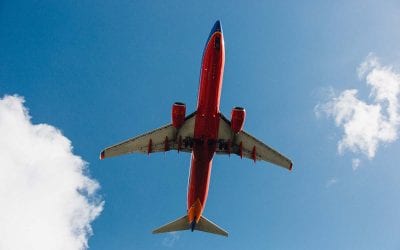Covid and influenza cases are spiking. RSV cases remain strong. Many travelers are masking again and unvaccinated travelers are seriously considering becoming vaccinated before their next journey.
 As the new year starts, it’s impossible to miss the news about respiratory illness trends occurring in the U.S. and elsewhere. There are daily reports about rapidly increasing cases of Covid and influenza, while RSV remains strong, even though it may have peaked.
As the new year starts, it’s impossible to miss the news about respiratory illness trends occurring in the U.S. and elsewhere. There are daily reports about rapidly increasing cases of Covid and influenza, while RSV remains strong, even though it may have peaked.
While there is no reason to stop traveling or drastically alter travel plans, health prevention and preparation are important during this winter travel season in the northern hemisphere. Vaccinations of the unvaccinated, practical preventatives and wearing masks are now under consideration by many travelers.
Covid hospitalizations have increased by 17 percent and Covid deaths by 10 percent in the U.S. in the last week.
In the week leading up to Christmas/New Year’s holiday travel, new Covid hospitalizations were in excess of 29,000 in the U.S. alone. Over the last two weeks in December, daily Covid hospitalizations were up 17 percent in the U.S. compared to the preceding two weeks. Deaths from Covid were up 10 percent during the same time. For those who insist that Covid is over, you might speak with the families of the more than 1,160,000 Americans who died from the virus in 2023, despite the availability of effective vaccines and treatments.
Influenza infections have increased by 16.1 percent, according to diagnostic tests for the flu in the last week.
 Influenza trends are also up in December. In the U.S., patient visits to healthcare providers are up 6.1 percent in the last week, indicating that the cases are severe enough that people felt that they needed professional medical help. The trend in clinical lab tests for influenza are troubling. In the last week, there was a 16.1 percent increase in positive tests for influenza. As travelers, we shouldn’t forget that influenza causes 31 million illnesses in the U.S., 360,000 hospitalizations and 21,000 deaths annually.
Influenza trends are also up in December. In the U.S., patient visits to healthcare providers are up 6.1 percent in the last week, indicating that the cases are severe enough that people felt that they needed professional medical help. The trend in clinical lab tests for influenza are troubling. In the last week, there was a 16.1 percent increase in positive tests for influenza. As travelers, we shouldn’t forget that influenza causes 31 million illnesses in the U.S., 360,000 hospitalizations and 21,000 deaths annually.
RSV is a respiratory disease that affects mostly infants and young children, plus older adults and those with chronic medical conditions. Currently, RSV cases seem to have peaked in mid-December as clinically detected cases have dropped about 38 percent, back to November levels. That’s good news for both families traveling with infants, as well as older travelers.
Respiratory illnesses can end a vacation or business trip before it starts or strand travelers in their hotel for days, a week or longer.
The problem with respiratory illnesses for travelers is that they can end a vacation or business trip before it begins, shorten it substantially or easily strand travelers in their hotel room for days, a week or possibly longer. Of course, these illnesses can also put travelers in the hospital or worse.
What do all of those numbers mean for travelers? My suggestion is to follow the science, talk to your family doctor, ignore politicians and so-called influencers.
Physicians and scientists have created proven vaccines to fight these respiratory viruses.
Physicians and scientists have created proven vaccines to fight these respiratory viruses. They are the first line of defense to prevent serious disease from Covid, influenza and RSV. For travelers who haven’t been inoculated with the latest Covid and influenza vaccines, what are you waiting for? You don’t have to take my word for it. Speak to your family doctor or to infectious disease experts. They’ll tell you to vaccinate.
As for the RSV vaccine, I followed the science and got it earlier this year as an older American, along with the latest COVID and flu vaccines. If you’re an older traveler, or an adult with chronic medical conditions such as heart or lung disease, speak to your physician about whether you should have the RSV vaccine. If you’re the parent of an infant up to a year old or with serious health problems, contact your child’s pediatrician to find out about having them inoculated with the RSV vaccine.
Travelers should discuss vaccination with their healthcare provider and gather information from legitimate scientific sources, not influencers or entertainment stars.
Before vaccinating, talk with your healthcare provider to see if you have allergies or conditions that any of the vaccines would adversely affect. If you have other questions, don’t hesitate for a second to ask physicians and scientists, the experts, about them. For your own research, gather your information from legitimate scientific sources, not social media influencers or entertainment stars.
After doing my research, I was vaccinated for each of the three viruses.
Use the below practical preventatives to help you stay healthy during your journeys.
For travelers, there are also practical preventatives that can be employed to help you stay healthy and prevent these three diseases to the extent possible while traveling and in the days and weeks before departing.
• Avoid close contact with people who are sick and who are showing symptoms of the viruses.
• Sanitize surfaces that are often germ-ridden in planes, trains, hotels, etc. Sanitize tray tables in planes and trains, TV remotes and switches in hotels and other often used surfaces touched by people who may have been sick.
• Wash your hands often. If soap and water aren’t available, use an alcohol-based hand rub/sanitizer.
• Avoid touching your eyes, nose and mouth, as germs can spread when a person touches a surface that’s contaminated with germs, then touches their eyes, nose or mouth.
• Get plenty of sleep, manage your stress, drink plenty of fluids and eat nutritiously.
N95 and KN95 face masks substantially reduce the transmission of airborne respiratory viruses like Covid, flu and RSV.
There is one more method that you can use to protect yourself from airborne viruses. Unfortunately, it’s become controversial, but it shouldn’t be so. It’s a scientifically proven technology to prevent viral transmission via respiratory aerosol transmission. It’s the face mask, especially the highly effective N95 and KN95 masks which cover one’s nose and mouth.
Particularly in tight inside locations, such as in a plane, or in large crowds, including waiting in line at TSA checkpoints or at airport gates waiting for flights, or in theaters, arenas, etc., an N95 or KN95 face mask, properly worn, can protect you from those around you who are sneezing or coughing or expelling respiratory aerosols full of virus from their breath while still being symptomless.
Effective protection from respiratory viruses by wearing a mask is not conjecture. Study after study in the last three years has proved that N95 and KN95 face masks are highly effective at preventing the transmission of respiratory viruses. Even looser fitting surgical masks offer some protection against some respiratory virus transmission, but they’re not nearly as effective as N95 and KN95 masks.
Wearing N95 and KN95 face masks in crowded areas while traveling will help you stay healthy.
I’m back to wearing N95 and KN95 masks in planes, airports, train stations, trains, buses, subways, theaters, etc. I’m more than aware that some people don’t believe in the efficacy of wearing a face mask and try to bully you into not wearing it. On a recent train, I told a man who was yelling at me for wearing a face mask to “Bugger off.”
 With Covid, flu and RSV infections at high rates, I’m going to take scientifically proven action to protect myself against these diseases and enjoy my travels in good health. I follow the advice from scientific and medical experts to keep me safe. Over recent years I’ve spoken to countless scientists, physicians, as well as public health and infectious disease experts. I’ve followed that up by reading dozens of peer reviewed scientific papers. They tell me that vaccines, practical health prevention practices and masking will help me stay healthy and/or prevent serious illness. Scientific studies and statistical analysis back them up. I recommend we all follow their advice whenever we travel.
With Covid, flu and RSV infections at high rates, I’m going to take scientifically proven action to protect myself against these diseases and enjoy my travels in good health. I follow the advice from scientific and medical experts to keep me safe. Over recent years I’ve spoken to countless scientists, physicians, as well as public health and infectious disease experts. I’ve followed that up by reading dozens of peer reviewed scientific papers. They tell me that vaccines, practical health prevention practices and masking will help me stay healthy and/or prevent serious illness. Scientific studies and statistical analysis back them up. I recommend we all follow their advice whenever we travel.
I wish you and all of my readers a Happy and Healthy New Year.
After many years working in corporate America as a chemical engineer, executive and eventually CFO of a multinational manufacturer, Ned founded a tech consulting company and later restarted NSL Photography, his photography business. Before entering the corporate world, Ned worked as a Public Health Engineer for the Philadelphia Department of Public Health. As a well known corporate, travel and wildlife photographer, Ned travels the world writing about travel and photography, as well as running photography workshops, seminars and photowalks. Visit Ned’s Photography Blog and Galleries.



